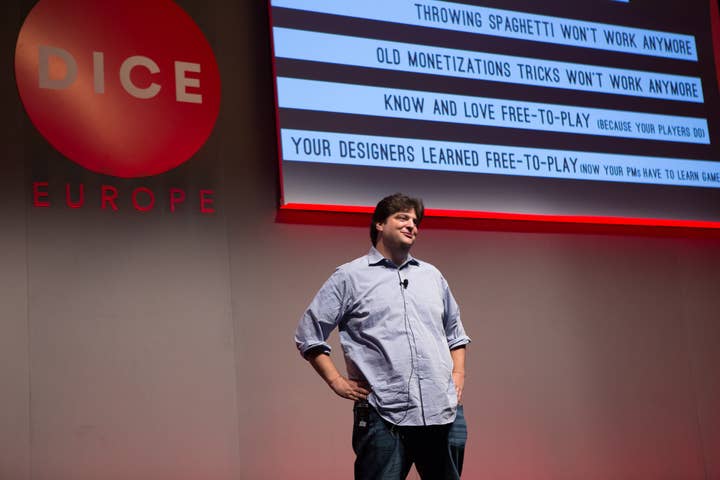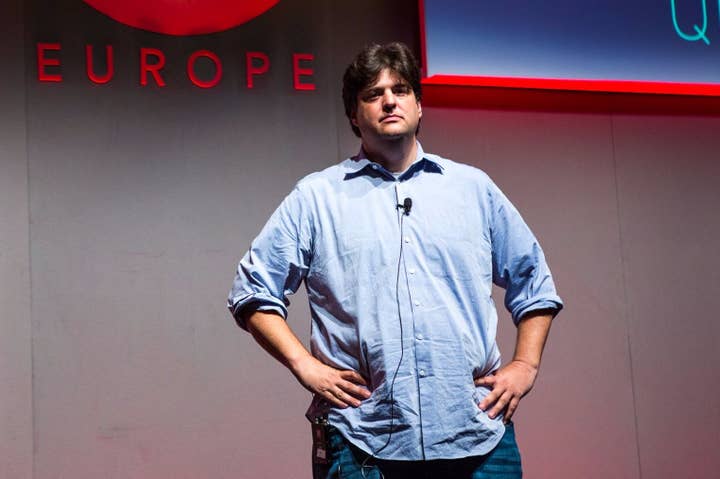"We've lost our internal compass for what 'good' even means any more"
Kabam's Aaron Loeb on a vital transition in mobile free-to-play, and the need to move on from the conflict of the past
Kabam's Aaron Loeb believes that the era of mercenary monetisation tricks in free-to-play mobile games is drawing to a close - the audience is now more sophisticated than ever, and developers would be wise to follow suit.
Speaking at DICE Europe, Kabam's president of studios opened his presentation with a single, pointed question: "How many people here wake up in the morning just eager to make a terrible game?"
Met with inevitable silence and a dearth of raised hands, he said, "Absolutely none of us. But the truth that we've been experiencing these past years is that, as an industry, we've lost our internal compass for what 'good' even means any more. We are divided as creatives.
"That division comes from a lack of understanding of what matters as a developer."
It's worth noting that when Loeb mentions the "industry" here, he is referring to mobile game development, which is dominated by various iterations on the free-to-play business model. Loeb noted that this part of the games industry has been through "endless transitions" in the last seven years, but it is now on the cusp of another.
In explaining that transition, Loeb invoked Paula Vogel, an American playwright who suggested a framework for understanding the way the audience for a given medium evolves and changes over time. An audience encountering a new art form moves through three distinct phases: Naive, which is defined by ignorance of even the most basic rules and tropes; Sophisticated, when the understanding of the rules allows specific personal tastes to form; and Decadent, when the rules are so well understood that both creator and audience can play with those assumptions.
"If you decide that good is defined by numbers, you ultimately end up promoting behaviours in development that are about driving numbers"
"Audiences in video games - in every cycle and on every platform - have gone from Naive to Sophisticated to Decadent," Loeb said. "We are now a very Decadent console audience. And those transitions have become faster and faster as our industry has gone on."
In Asian markets like China and South Korea, where in-app purchases have been a common feature of mobile games for almost 15 years, the audience has been in the Sophisticated phase for quite some time already - in fact, they are already on the path to Decadence. In western markets like those in Europe and North America, however, where in-app purchases have only existed in mobile games since 2010 on iOS - and 2012 on Google Play - the form has been struggling through the Naive phase. And not just the audience, but the developers, too.
"We have essentially just finished up what I would call 'Phase One' of mobile free-to-play," Loeb continued. "The reason we are so divided as an industry is because we have two extremely conflicting definitions of 'good.' Some people in this industry still are not comfortable with free-to-play, and we fight about it still."
Loeb split these "conflicting definitions of good" into two camps. The first has been using, "the established laws of 'good' as video game makers," to influence their direction. That includes high degrees of immersion and fidelity, a ready supply of interesting choices, an abundance of features, and a reverence for both review scores and aggregator sites like Metacritic.
"That's camp one, and frankly, camp one kinda lost Phase One," Loeb said, taking care to point out the irrelevance of Metacritic averages, in particular. "A lot of companies made really traditional games and they didn't climb up the charts."
Loeb described camp two as "the metric camp," which assumes no knowledge of what 'good' means, and instead puts its faith in the numbers. This camp is responsible to a large degree for the negative perception of free-to-play mobile games.

"It has a day one retention of 40 per cent and an ARPU of 10 cents - let's just call that good," Loeb said, in a gently mocking tone. "If you decide that good is defined by numbers, you ultimately end up promoting behaviours in development that are about driving numbers.
"That means, in Phase One, we did all kinds of things to perpetuate user retention, such as energy mechanics and harshly gated play. We used hard gates to make the user spend money, and push the ARPU up. Frankly, we made games that largely benefited the bigger spenders.
"This is the camp that we can largely say has won Phase One. The games that are driven by metrics have been the most successful. They stay on the charts, they generate the most money, and that is generally what defines 'good' in Phase One."
The problem that developers have faced, though, is that despite the scale of certain games' success, the Naive phase has also been defined by a lack of surety about best practices. Loeb mentioned comments from GungHo about the vital role of luck in Puzzle & Dragons' astonishing rise, the five weeks it took Zynga to create FarmVille and the company's subsequent decline, and Rovio's 51 failures and near misses before finally hitting it big with Angry Birds.
Loeb didn't mention Rovio's current period of struggle, though it speaks to precisely the same issue. What he did suggest, however, was that the Phase One victory for the "metric team" was driven by the need to impose order where none existed, often to less than desirable creative results.
"Throw spaghetti against the wall and see what sticks has kinda been our answer. Like, Who knows? You're either lucky or not"
"Throw spaghetti against the wall and see what sticks has kinda been our answer. Like, Who knows? You're either lucky or not," Loeb said. "And the reason why is that we as game makers were in the Naive phase. We didn't know the difference between a good mobile free-to-play game and a bad mobile free-to-play game, and so we have spent the past five years discovering it with our audience."
In Loeb's view, free-to-play mobile developers in the west are now lagging behind the audience, which is increasingly Sophisticated in its tastes. Players are far more discriminating in what they will even download, let alone actually play, and they are demanding more detailed information to motivate them to do so. App store placement has a less predictable effect on commercial success than in the past, effective user acquisition is much more complicated, and the player is now wise to all of the tricks previously used to extract money from their wallets.
"They are on to all of the ways that you used to make free-to-play work that were calculating," he said. "Phase Two is going to be defined by the utter rejection of the sort of calculated tricks that a lot of us had distaste for in Phase One.
"Genre is now having a massively larger influence on how many installs you're going to get. It's also having a larger influence on how many people will install the game when acquired through user acquisition, and how cheap that acquisition will be. Visuals are having a much bigger influence than ever. Video is having a staggering influence in user acquisition, and it has radically lowered costs.
"The point is that consumers are becoming more Sophisticated; more picky about which games they want to play, and more picky once they're in the game about what they think is good or bad... In this new marketplace, where the user has become much more Sophisticated, it requires that the makers of games also cease to be Naive. It calls for a world in which we, as developers, make fewer and more focused bets, made by people who love mobile and love free-to-play.
"I'm gonna repeat those: love mobile and love free-to-play. You cannot be somebody with a distaste for free-to-play and push it to your consumer. Why? Because the players don't hate free-to-play.
"They have Sophisticated tastes about it. You need to have them too."
GamesIndustry.biz attended DICE Europe as a guest of the organiser. As a part of that arrangement, attendance, travel and accommodation costs were covered by the organiser.









